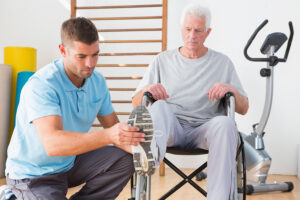Proactive Steps Seniors Can Take To Manage Diabetes
Managing diabetes can be difficult for seniors. Taking proactive steps to change their lifestyles and making healthier choices in diet and exercise can make a significant difference. When seniors understand how diabetes affects their body and learn more about managing their blood sugar, they can reduce the risk of developing serious side effects of diabetes, such as blindness.

Elder Care: Senior Diabetes in La Crescenta, CA
Elder care is something that can help seniors with diabetes be more proactive about managing their disease. With elder care seniors have the support they need to change their lifestyles and embrace things like healthier meals and daily exercise.
In addition to getting elder care, seniors can take these proactive steps to manage their diabetes:
Check Blood Sugar Often
Seniors who have diabetes need to check their blood sugar often. At first, this may be difficult and inconvenient. But over time regular monitoring will help seniors understand how their body reacts to insulin and what their normal blood sugar levels are.
Choose Plants
Changing diets can be tough for seniors too, but it’s one of the best ways for seniors to manage diabetes. Embracing a plant-based diet can be a big change for seniors who are used to eating lots of meat or processed foods. But learning to love a veggie-based diet can help manage insulin resistance, help seniors maintain a healthy weight, and improve a senior’s overall health.
Move, Move, Move
Movement is critically important for seniors with diabetes. But, seniors don’t need to immediately commit to a strenuous exercise routine to see improvement in their diabetes management. Simply moving more throughout the day can make an impact. A good way to start is for seniors to buy a fitness tracker and just start tracking their steps. Hitting 8,000 steps a day is easy to do and will make a difference.
Regular Check-Ups
Scheduled check-ups with healthcare professionals are crucial for seniors with diabetes. Working with their doctor is essential for seniors to learn how to manage diabetes at home. And, monitoring of blood pressure, cholesterol levels, and kidney function is important for a senior’s overall health.
Make Foot Care A Priority
Diabetes can affect blood circulation and nerve function, particularly in the feet. Seniors should inspect their feet daily for any cuts, sores, or infections. Proper foot care, including regular visits to a podiatrist, can prevent complications and ensure early intervention if any issues arise. Seniors should also invest in good quality footwear and socks designed for people with diabetes that won’t pinch or cut off circulation. If seniors have edema or swelling as a result of poor circulation they should move more and ask their doctor about wearing compression socks.
Keep Learning
Diabetes affects every person differently, so seniors should spend some time learning more about diabetes and how it can affect them. By continuously learning more about the disease seniors will be better able to take proactive steps to manage it and avoid developing the most severe symptoms of diabetes.

